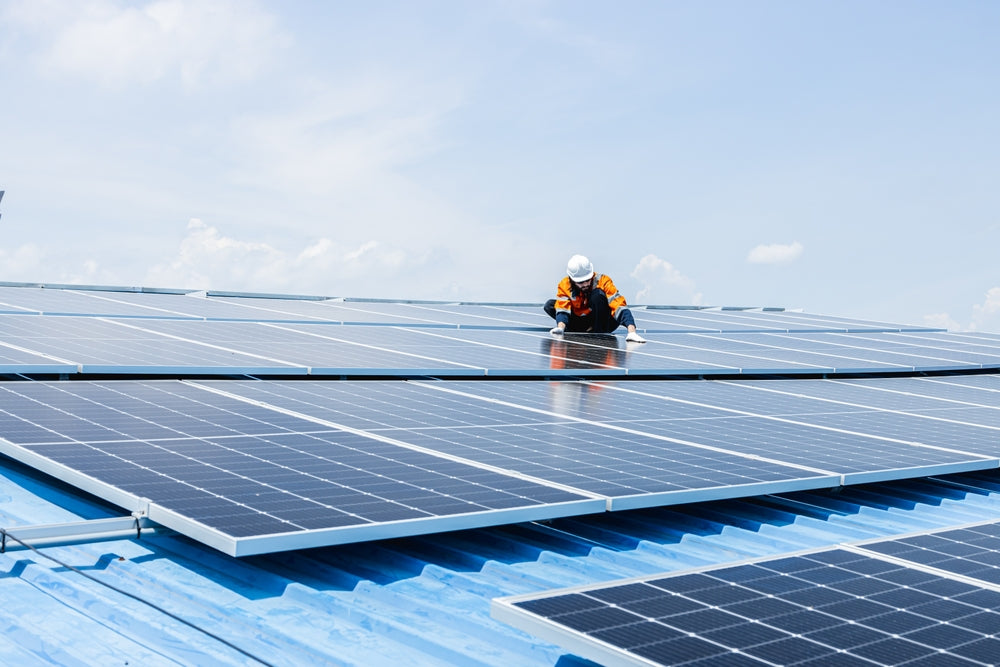
Today, solar panels are one of the most sought-after technologies that help homeowners capture energy from the sun and save money on their bills. This Solar Panels Guide will guide you through the whole process of getting to know the solar panels, starting with the Pakistani brand Powerhouseexpress and other crucial aspects.
Understanding Solar Panels
Before diving deeper into the specifics, it’s important to understand the fundamentals of solar panels. This Solar Panels Guide will break down the basic concepts and components involved.
What Are Solar Panels?
Solar panels, also known as photovoltaic (PV) panels, are devices that convert sunlight into electricity. They are made up of many solar cells, which are typically composed of silicon. When sunlight hits these cells, it creates an electric field that generates a flow of electricity.
How Do Solar Panels Work?
Solar panels work by capturing sunlight with photovoltaic cells. These cells are arranged in a grid-like pattern and connected to form a panel. When sunlight hits the cells, it excites electrons in the silicon, creating an electric current. This current is then converted into usable electricity by an inverter, which can be used to power your home or business.
Types of Solar Panels
There are three main types of solar panels: monocrystalline, polycrystalline, and thin-film. Each type has its advantages and disadvantages.
Monocrystalline Panels: Made from a single crystal structure, these panels are known for their high efficiency and sleek appearance. They perform well in low-light conditions but are generally more expensive.
Polycrystalline Panels: Made from multiple crystal structures, these panels are less efficient than monocrystalline panels but are more affordable. They are a good choice for those on a budget.
Thin-Film Panels: Made from a variety of materials, these panels are known for their flexibility and lightweight design. However, they are less efficient and may require more space.
Benefits of Solar Panels
Solar panels offer numerous benefits, making them an attractive option for many people. This Solar Panels Guide will highlight some of the key advantages.
Reducing Energy Bills
One of the most significant benefits of installing solar panels is the reduction in energy bills. By generating your electricity, you can lower your reliance on the grid and reduce your monthly expenses.
Environmental Impact
Solar panels are a clean and renewable source of energy. They help reduce greenhouse gas emissions and lower your carbon footprint, contributing to a more sustainable future.
Increase Property Value
Homes with solar panels often see an increase in property value. Buyers are increasingly looking for energy-efficient features, and solar panels can make your property more attractive to potential buyers.
Low Maintenance
Solar panels require minimal maintenance. Once installed, they typically need only periodic cleaning and inspection to ensure they are operating efficiently.
Powerhouse, Leading the Solar Revolution in Pakistan
When it comes to solar energy in Pakistan, Powerhouse stands out as a leading brand. With its commitment to quality and innovation, Powerhouse has established itself as a reliable choice for solar panel solutions in the region. Their products are designed to meet the diverse needs of Pakistani consumers, from residential to commercial applications.
Why Choose Powerhouse?
Powerhouse is known for its cutting-edge technology and high-efficiency solar panels. They offer a range of products that cater to different energy needs and budgets. What sets Powerhouse apart is its focus on durability and performance, ensuring that its panels can withstand Pakistan's varied climate conditions.
The brand also provides excellent customer support, making it easier for users to get the most out of their solar investment. Whether you're looking to reduce your electricity bills or contribute to a more sustainable future, Powerhouse offers a range of solutions to meet your needs.
Installing Solar Panels
Installing solar panels is a significant investment, and it’s essential to understand what to expect during the process. This Solar Panels Guide will outline the key steps involved.
Assessing Your Energy Needs
Before installation, it’s important to assess your energy needs. This involves evaluating your current energy consumption and determining how much solar power you require. A professional installer can help you with this assessment.
Choosing the Right Panels
Selecting the right solar panels is crucial for maximizing your investment. Consider factors such as efficiency, warranty, and cost when choosing panels. Brands like Powerhouse offer a range of options to suit different needs and budgets.
Finding a Reputable Installer
Choosing a reputable installer is vital for a successful installation. Look for installers with experience, good reviews, and proper certifications. A professional installer will ensure that your panels are installed correctly and efficiently.
The Installation Process
The installation process typically involves several steps:
Site Assessment: The installer will assess your property to determine the best location for the panels.
Design and Planning: A system design will be created based on your energy needs and property layout.
Installation: The panels and associated equipment, such as inverters and mounting systems, will be installed.
Inspection and Testing: Once installed, the system will be inspected and tested to ensure it’s operating correctly.
Costs and Financing
The cost of installing solar panels can vary depending on the size of the system and the type of panels chosen. Many regions offer incentives and financing options to help offset the initial investment. Explore available options to find the best financial solution for your situation.
Maintaining Your Solar Panels
Proper maintenance is essential to ensure your solar panels continue to operate efficiently. This Solar Panels Guide will cover some basic maintenance tips.
Regular Cleaning
Dust, dirt, and debris can accumulate on your solar panels and reduce their efficiency. Regular cleaning can help maintain optimal performance. In many cases, rain will naturally clean the panels, but occasional manual cleaning may be necessary.
Monitoring Performance
Keep an eye on your solar system’s performance to ensure it’s generating the expected amount of electricity. Most systems come with monitoring tools that allow you to track performance and detect any issues.
Professional Inspections
Periodic professional inspections can help identify any potential problems before they become major issues. Regular check-ups can ensure that your system remains in good working condition.
Solar Panels and Energy Storage
Adding energy storage to your solar panel system can significantly enhance its effectiveness. Energy storage systems, like solar batteries, allow you to store excess energy generated during the day for use at night or during cloudy periods. This ensures you have a reliable power supply and can make the most of the energy your solar panels produce.
Benefits of Energy Storage
Energy Independence: Storing energy reduces your reliance on the grid, providing power during outages or peak times.
Cost Savings: By using stored energy during high-rate periods, you can lower your energy costs.
Optimized Energy Use: Efficiently manage your energy consumption and maximize the benefits of your solar panel system.
Choosing the Right Storage System
When selecting a storage system, consider factors such as capacity, compatibility with your solar panels, and cost. Work with a professional to determine the best solution for your needs and ensure seamless integration with your existing solar setup.
The Future of Solar Panels
The solar panel industry is continually evolving, with innovations and trends shaping the future of solar energy. Staying informed about these developments can help you make better decisions about your solar investment.
Emerging Technologies
Bifacial Solar Panels: These panels are modeled with the capacity of harvesting light from both sides hence making them more efficient in energy production.
Flexible Solar Panels: They are usually thin in structure to provide easier installation and can be easily incorporated into many surfaces/types of construction.
Solar Panel Efficiency Improvements: Current research proposals seek to enhance the efficiency level of solar panels in a bid to produce higher output power from the available sunlight.
Market Trends
Decreasing Costs: Technology is improving and there is more competition which means that installing a solar panel is not as costly as it was a few years ago.
Government Incentives: There are various incentives and rebates provided across many regions that make the cost of going solar even lower.
Integration with Smart Technology: It is common these days to find solar panels with smart home systems, to enhance the management of energy in the homes.
Conclusion
This Solar Panels Guide has discussed the basic information regarding solar panels and also highlighted a Pakistani brand named Powerhouse. And so, irrespective of the type or size of the solar panel, this Solar Panels Guide will help you know the basics of solar panels, and how you can install and maintain them.
Apart from the energy savings, decreased energy bills, and an enhanced environmental status, you get the benefit of higher property worth if you install solar panels. As is revealed by this article, with the correct information and an ideal brand such as the Powerhouse, it is possible to effectively utilize the sun and consequently enhance your own life as well as that of the people you interact with in the universe.
This updated Solar Panels Guide guarantees that you’re fully informed as you make decisions about your solar power requirements.








